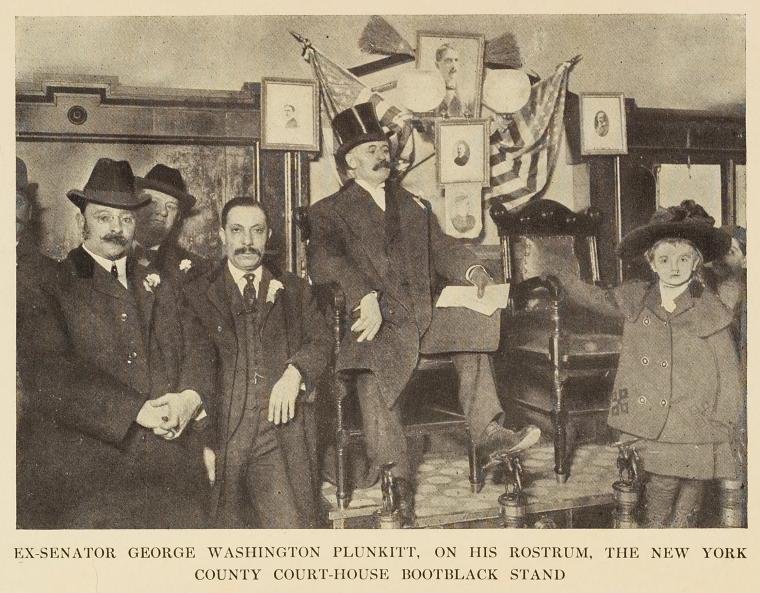The Grinch Who Steals Christmas
In the early 1900s Tammany Hall politician George Washington Plunkitt famously bragged that he had gained his fortune through “honest graft.” He believed it was within his right to take advantage of his power and privilege for his own personal financial gain. If he received inside information, for instance, that a new development was in the works in a certain part of New York City, why shouldn’t he use that knowledge to acquire land in the proposed location, and then sell the land back to the developers and make a handsome profit. It didn’t matter to Plunkitt that no one else was privy to that information. He cunningly wheeled and dealed through “honest graft” to enrich himself and his cronies.
So bold and oblivious to ethical conduct was Plunkitt that he called politicians “fools” for not following his method of so-called honest graft. And what’s worse, year after year he was reelected to office, even though his constituency knew he was accumulating wealth through questionable means.
Greed, the unquenchable lust for more, even at the expense of others, has been around since the Garden of Eden. Greed results from an insatiable appetite to accumulate and horde, and unless we learn to discipline that drive, we, too, will become ensnared in its web. Legend has it that John D. Rockefeller was once asked, “How much is enough?” and he is reported to have replied, “Just a little bit more.”
During my years as a pastor I have seen how greed can tear families apart. I have been present with families, after the death of a loved one, when the grieving was eclipsed by concerns over how the estate would be divided. Sometimes these quarrels became so bitter that brothers and sisters turned on each other.
Greed destroys our ability to enjoy and appreciate life much like an addictive drug. At first, newly acquired wealth provides a lifestyle that makes our lives better—we can afford a larger home, we can finally buy that car we always wanted, and we can sock money away for a rainy day—but soon the addiction controls us and no matter how much we have, we always crave for just a little bit more. The craving for more and more can wreck our lives and rob us of one of the most satisfying joys of life—contentment. The richest people are the ones who are satisfied with what they have.
Wealth, of course, is not necessarily evil but can become evil when we become its slave instead of its master. Whenever we use our power or position to gain an unfair economic advantage over other people, then wealth becomes evil. Whenever we pursue financial gain through avenues similar to so-called “honest greed,” we stoop to the level of fools because we are willing to forfeit our integrity for that which is worth infinitely less. What benefit do we derive if we increase our wealth but impoverish our souls?
During the holiday season our ability to master our desires is severely tested. Christmas seems to bring out the best in us and, unfortunately, sometimes the worst. Businesses pull out all the stops to convince us that we need to buy the latest gadget or the most advanced computer or any number of hundreds of other items. Be careful that you don’t become so enthralled in gaining what you think you can’t live without that you lose what makes life worth living. Remember that almost every gift you unwrap this year will one day end up in a garage sale or a garbage dump.
You probably have read or seen the children’s story The Grinch Who Stole Christmas. The Grinch is a lonely and grouchy figure who hates Christmas because he thinks the festive holiday is only about stuffing our mouths with rich foods and doling out money we don’t have to buy things. He tries to remove the joy of Christmas from a small town by stealing all the gifts, decorations and food on Christmas Eve. When the Grinch successfully steals all the trappings of Christmas, he expects the town to be overcome with despair. He is shocked on Christmas morning, however, as he intently listens to the townsfolk, who in spite of their loss, sing the joyful songs of Christmas. It is only then that the Grinch realizes that Christmas consists of more than things, but is a spirit, an attitude, that transcends material wants.
Whenever we allow greed to dominate our lives and fail to remember the true meaning of Christmas, we, in effect, allow the Grinch to steal Christmas. And many of us, unwittingly, allow the Grinch to rob us of the Christmas spirit year after year by thinking that we have to have more. By all means, buy a gift or two for your loved ones, but know that Christmas is not about gifts--the joy of Christmas comes from being together with family and friends and remembering the gift of hope who was born into the world so many centuries ago. It is the One born into poverty who teaches us the true meaning of wealth.




